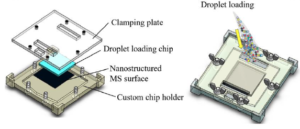APPLICATIONS OF TECHNOLOGY:
- Synthetic biology
- Biofuel production
- Drug development
ADVANTAGES:
- Enables screening of hundreds of thousands of enzymes, which has not been feasible with any conventional method
- Allows investigation of multiple enzyme/substrate combinations as well as analysis of synergistic interactions and multi-step metabolic pathways
- Potential to discover new enzymes and multi-step metabolic pathways
ABSTRACT:
Researchers at Berkeley Lab’s Joint BioEnergy Institute (JBEI) invented a new approach for screening of massive scale enzyme libraries through metabolite detection. This new chip design couples matrix-free surface based mass spectrometry imaging and nanostructure-initiator mass spectrometry, with droplet microfluidics. One of the conventional methods for online mass spectrometry analysis is coupling electrospray ionization with microfluidics, but there have been difficulties with decreased sensitivity over many thousands of consecutive measurements.
This design is a novel microfluidic approach enabling rapid and massive sample array construction directly above a nanostructured MS surface for high-throughput combinatorial screening of enzymatic activity against substrate libraries via mass spectrometry. This flexible process accommodates more droplets per site, enabling the investigation of multiple enzyme/substrate combinations as well as analysis of synergistic interactions and multi-step metabolic pathways. This will be the first platform to execute massive scale enzyme screening which will advance synthetic biology, bioenergy production, and drug development.
DEVELOPMENT STAGE: Proven principle
STATUS: Patent pending. Available for licensing or collaborative research.
